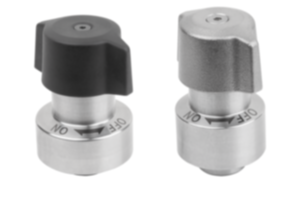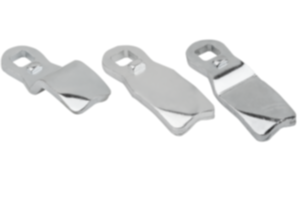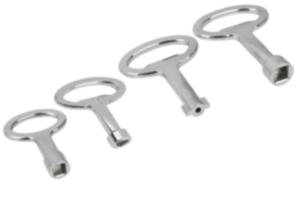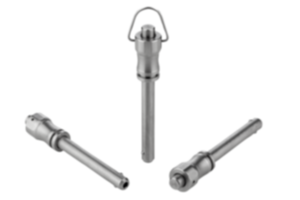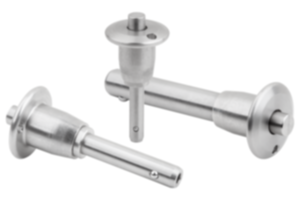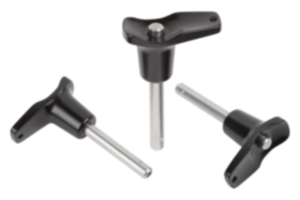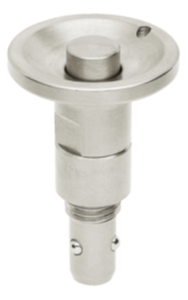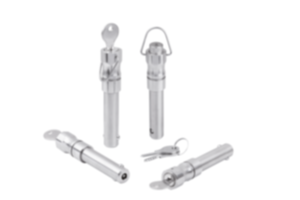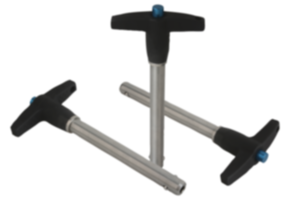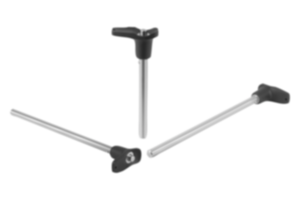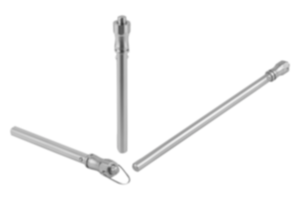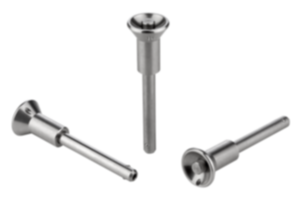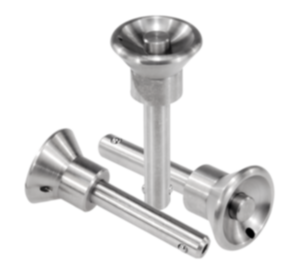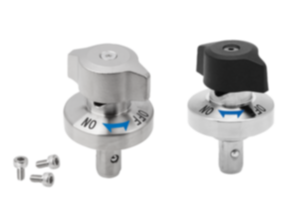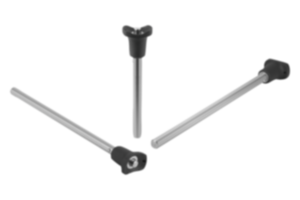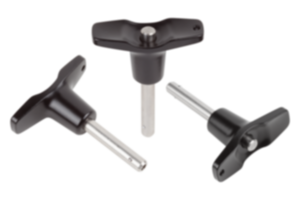Material
Pin stainless steel 1.4542.
Head and push button stainless steel 1.4305.
Balls stainless steel 1.4125.
Spring stainless steel.
Grip ring and key ring stainless steel.
Version
All stainless steel parts passivated.
Pin, hardened to min. 40 HRC.
Balls hardened to 58 +4 HRC.
Pin, hardened to min. 40 HRC.
Balls hardened to 58 +4 HRC.
Show more
Show less
Description
Material
Pin stainless steel 1.4542.
Head and push button stainless steel 1.4305.
Balls stainless steel 1.4125.
Spring stainless steel.
Grip ring and key ring stainless steel.
Version
All stainless steel parts passivated.
Pin, hardened to min. 40 HRC.
Balls hardened to 58 +4 HRC.
Pin, hardened to min. 40 HRC.
Balls hardened to 58 +4 HRC.
Note
Ball lock pins are used for easy fastening or joining of components or workpieces.
The two balls are disengaged by pressing the push button and the pin can be slipped into holes in the workpieces. Release the button to lock the balls and secure the connection. If required, the ball lock pins can be fitted with a retaining cable.
The hardened, high-tensile stainless steel pin permits extreme loads with low wear. Thanks to the high corrosion and acid resistance, they are mainly used in the foodstuff industry, in the chemical and petrochemical industry and as constructional elements in the aerospace industry.
Shear force double shear (F) = S · τ aB max.
The values given for the shear force are the theoretical breaking load.
These are non-binding reference values without consideration of safety factors and exclude any liability. The values given are for information purposes only and do not constitute a legally binding assurance of properties.
The load values have been calculated in accordance with DIN 50141. Each user must determine individually whether the ball lock pin is suitable for the respective application.
Different materials in which the ball lock pins are used, weather conditions and wear can influence the determined values.
The two balls are disengaged by pressing the push button and the pin can be slipped into holes in the workpieces. Release the button to lock the balls and secure the connection. If required, the ball lock pins can be fitted with a retaining cable.
The hardened, high-tensile stainless steel pin permits extreme loads with low wear. Thanks to the high corrosion and acid resistance, they are mainly used in the foodstuff industry, in the chemical and petrochemical industry and as constructional elements in the aerospace industry.
Shear force double shear (F) = S · τ aB max.
The values given for the shear force are the theoretical breaking load.
These are non-binding reference values without consideration of safety factors and exclude any liability. The values given are for information purposes only and do not constitute a legally binding assurance of properties.
The load values have been calculated in accordance with DIN 50141. Each user must determine individually whether the ball lock pin is suitable for the respective application.
Different materials in which the ball lock pins are used, weather conditions and wear can influence the determined values.
Accessory
Safety spiral cable K0367.10200
Retaining cable with loop K0367. .....
Key ring K0367.15/19/23
Bushing for ball lock pins K0724....
Retaining cable with loop K0367. .....
Key ring K0367.15/19/23
Bushing for ball lock pins K0724....
Important note on downloading CAD models
You must log in before you can download our CAD models. If you have not yet created an account, please register under "My account" (right-hand side of the screen) and follow the instructions.



